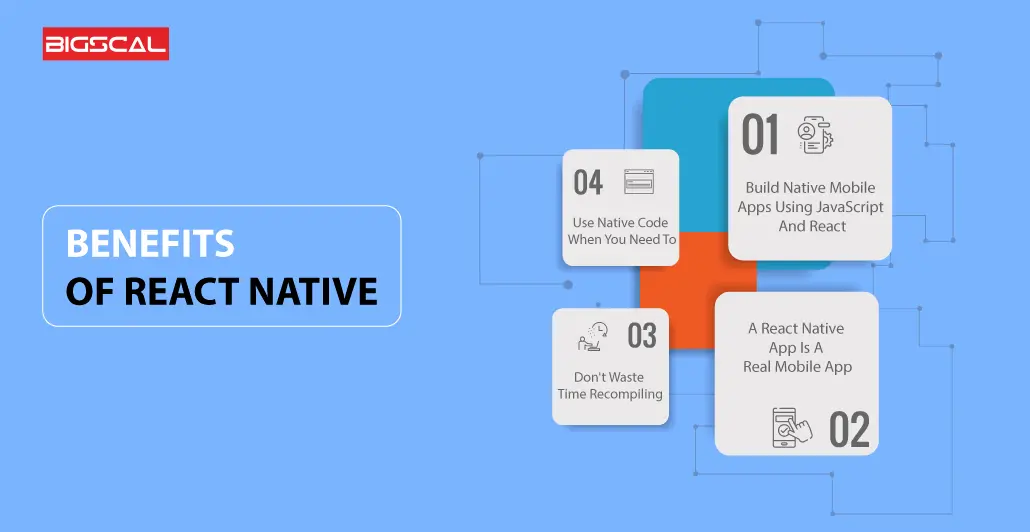What Is React Native?
Quick Summary: React native is a platform for building mobile apps using javascript. To decide if it suits your needs, understand its workflows and suitability for cross-platform.
Understanding React Native
React Native has been successfully embraced by many companies across the world. What makes the Native platform so popular? One of the significant factors in its success is its ability to run on multiple platforms from a single codebase.
Therefore, partnering with React Native development company is a wise choice due to their expertise in building modern web applications using React Native’s libraries and industry best practices.
Choosing the right React Native platform will work for you; you must understand how it works and determine whether it fits. Let’s dive deep into the article!
A brief overview of React Native app development
React Native (RN) is a mobile app framework built with javascript that allows developers to construct native mobile apps that work on both iOS and Android.
Furthermore, developers can use the same code base to build applications that perform on multiple devices or platforms. This platform was constructed by Facebook in 2015 and released as an open-source project.
This framework has become one of the preferred choices for building mobile apps in just a couple of years. Additionally, this framework has empowered some of the world’s leading brands, including Instagram, Skype, and Facebook.
Thus, choosing React native app development services is a wise decision to meet business requirements because of their specialized skills in creating cross-platform mobile apps efficiently and effectively.
History of React Native

Instead of developing a native app like many top tech firms at the time, Facebook first made its service available on mobile devices via a mobile webpage based on HTML5. While this solution could improve both UI and performance, it needed to be able to keep up with the times, requiring updates to both.
Mark Zuckerberg and his team’s biggest mistake in 2012 was focusing too much on HTML instead of native apps.”
Using JavaScript, Jordan Walke discovered a way to generate UI elements for iOS apps shortly after that, in 2013. Furthermore, a special Hackathon examined how JavaScript solutions could be adapted to mobile development (traditionally web-based).
As a result, this framework was invented. In 2015, Facebook released a public version of the framework, initially only available for iOS.
GitHub contributors rank this platform as the second-largest project within three years. With over 9,100 contributors, it came sixth in 2019.
Benefits of React Native.

Below we highlighted a few reasons to prefer this platform for native app development:
1.Build Native Mobile Apps Using JavaScript And React
Native platforms help developers construct mobile apps by utilizing the JavaScript framework. Furthermore, it uses the same design as React, letting you compose a rich mobile UI from declarative components.
2. A React Native App Is A Real Mobile App
With React Native, you don’t build a “mobile web app,” an “HTML5 app”, or a “hybrid app.” You make a real mobile app indistinguishable from an app built using Objective-C or Java. Furthermore, it uses the same fundamental UI building blocks as regular iOS and Android apps. You just put those building blocks together using JavaScript and React.
3. Don’t Waste Time Recompiling
Native platforms let you build your app faster. Instead of recompiling, you can reload your app instantly. You can even run new code with Hot Reloading while retaining your application state. Give it a try – it’s a magical experience.
4. Use Native Code When You Need To
RN combines smoothly with Objective-C, Java, or Swift components. It’s simple to drop down to native code if you need to optimize a few aspects of your application. Furthermore, It’s also easy to build part of your app in React Native and part of your app using native code directly – that’s how the Facebook app works.
How does React Native work?

Native components allow developers to build apps that interpret JavaScript code by natively bridging the app to the target platform using JS threads. Through the bridge concept, the hierarchy of the component is translated to the mobile device’s view using the library.
Furthermore, JavaScript can handle events such as pressing a button when the user presses it. Consequently, it enables React components to understand and work with native events.
This native platform creates an application method to build a project structure, including essential files and configurations. This jumpstarts development, providing a foundation for building cross-platform mobile applications efficiently.
Lastly, if you have any questions About React Native, seek help with custom React Native app development services to create authentic and high-performance mobile apps, propelling your business to the next level through tailored solutions and exceptional user experience.
Conclusion
A native platform is an excellent option for building apps that work smoothly on all devices. Furthermore, this framework is highly preferred by developers and businesses. It streamlines the app development process, saves developers time and effort, and is cost-efficient. By releasing the software on multiple platforms simultaneously, you can reach a wider audience – since one app can be used by Android and iOS users, the launch can be coordinated, and companies with smaller budgets for development can develop on more than one platform.
Are you in need of assistance with a React Native project? Contact Bigscal. Bigscal is a prominent React native mobile app development service that delivers top-notch solutions focusing on innovation, efficiency, and customer satisfaction.
FAQ
What is React Native, and what is it used for?
The RN framework allows you to write native iOS and Android applications using JavaScript. In other words, it uses React, Facebook’s JavaScript library, for building user interfaces, but it targets mobile devices rather than web browsers.
What is React JS vs React native?
React JS is useful for designing web applications (apps that run on a web browser). In contrast, React Native allows developers to build cross-platform mobile applications (cross-platform mobile applications); React creates user interfaces using HTML, CSS, and JavaScript.
What language is React Native?
Javascript. Furthermore, it is a framework invented by Facebook designed to create native-style applications for iOS and Android.
Is React Native only for the front end?
Native platforms allow developers to build the application’s front end and collaborate with other development teams to ensure the application’s quality.
Should I learn React Native in 2023?
The Native framework is entirely new, but it has become trendy. Furthermore, this platform is predicted to become the most popular framework for building cross-platform mobile applications. It is worth learning in 2023 if you plan to do so.






